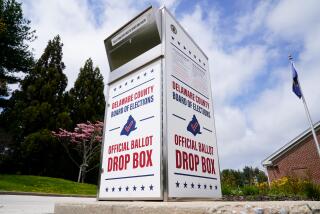Ads Aim to Sway Senators on Yucca Dump
- Share via
LAS VEGAS — Opponents of radioactive storage at Nevada’s Yucca Mountain aired their first television commercial Tuesday, warning Vermont audiences about the dangers of shipping spent nuclear fuel rods cross-country to the volcanic ridge 90 miles northwest of here.
The ad will run several hundred times in Burlington, Vt., at a cost of about $300,000, said Mark Brown, a media consultant employed by Nevada.
The 30-second spot shows a truck as it would carry nuclear waste from a reactor to Nevada. Menacing music can be heard.
“With over 50,000 nuclear trucks and trainloads moving through our streets, even the government admits nuclear accidents are inevitable,” the announcer says. “And terrorist attacks will become harder than ever to prevent. Only the Senate can stop this now. Call your senators today.”
The ad is endorsed by the Vermont chapters of the Sierra Club, the U.S. Public Interest Research Group and Physicians for Social Responsibility--among the nation’s most politically active grass-roots lobbying groups--and was financed by the state of Nevada.
Strategists said the ad made its debut in Vermont--a relatively inexpensive launching ground for the TV campaign--because of its history of environmental activism and because its senators are believed to be open-minded on the issue, despite their stated positions.
In response to the ad, Sen. James M. Jeffords, an independent, issued a written statement Tuesday: “The alternative to Yucca Mountain would be to store spent nuclear fuel in dry casks on the banks of the Connecticut River, which I believe poses serious and unacceptable environmental and safety risks.”
Vermont’s other senator, Democrat Patrick J. Leahy, said through a spokesman that he favors Yucca Mountain but has questions about the safety of transporting radioactive fuel rods across the country.
The Bush administration has said it is safer to ship 77,000 tons of spent fuel rods to Yucca than to keep it stored at more than 100 facilities in 37 states. Critics say the nuclear waste would be vulnerable to accident or terrorism if shipped and that, in any case, there will always be some fuel rods stored alongside reactors.
Last week, Nevada Gov. Kenny Guinn rejected President Bush’s selection of Yucca Mountain to store the radioactive waste, and now the Senate and House must vote to keep the project alive.
The Senate is expected to vote in July, and about 65 senators are believed to favor use of Yucca Mountain. Lobbying is underway to change the minds of 15 of them. A House vote backing Yucca Mountain is likely.
Opponents of Yucca Mountain hope the ad will agitate viewers to ask their senators to oppose the $60-billion project. Brown said the ad campaign will air next in Missouri, Utah and Oregon.
So far, about $6.7 million has been set aside to fund the campaign, including $1.5 million that Clark County commissioners in Las Vegas authorized Tuesday. The county previously allocated $1 million, and Nevada state legislators set aside $4 million. The balance of the fund came from other counties.
Anti-Yucca activists hope their campaign coffers will grow by an additional $6 million because Nevada lawmakers pledged last week to match private donations dollar-for-dollar with $3 million of additional state money.
In the week since Guinn asked Nevadans to contribute $1 each to help keep Yucca nuclear-free, more than $77,000 has been raised, including a $75,000 donation from Dorothy Lemelson, widow of an inventor of consumer electronics.
Also Tuesday, several hundred environmental activists rallied on the steps of the U.S. Capitol, pledging to mount a grass-roots campaign to oppose the project.
“If we license Yucca Mountain, every day can be Sept. 11 because that is the kind of threat we’re exposing our nation, our communities, our families to,” said Sierra Club President Carl Pope.
At an earlier news conference, Rep. Joe Barton (R-Texas) voiced his support of the project. “After decades of confirming scientific research and billions of dollars spent, it’s time for the federal government to fulfill its obligation to safely store the nation’s used nuclear fuel.”
Associated Press contributed to this report.
More to Read
Sign up for Essential California
The most important California stories and recommendations in your inbox every morning.
You may occasionally receive promotional content from the Los Angeles Times.













